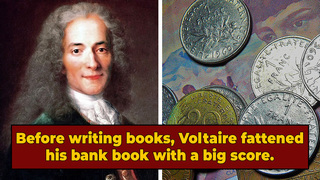How A $40 Million Lotto Heist Changed Philosophy History

When Voltaire, the greatest wit of the Age of Reason, wrote about his visit to the London Stock Exchange, he noticed people from all walks of life coexist on the rowdy trading floor. This reaffirmed his belief that money, not faith in something you can't control, is what can bring people together. And what better way to find a practical application to this philosophical theory than to bring a group of friends together to scam the lotto.
Some background music for you while you read the rest of this tale.
Throughout the centuries, there has been only one successful way to rig a lottery -- cold, hard mathematics. It's a good thing, then, that in his 30s, Voltaire met a mathematician by the name Charles-Marie de La Condamine. During the same period, a state lottery craze hit Paris, with districts giving out tickets for buying municipal bonds in an attempt to reinvigorate the economy. And since, as a dandy, Voltaire was having some money issues, de La Condamine confided in him that the French government had made a fatal mistake:
If one were to buy all the cheapest bonds in the city, the prize money remained large enough that you could bet every combination and still make a merde-tonne of francs.
So, being a rationalist, Voltaire rationally rounded up de La Condamine and 11 of his least scrupulous buds to pool their money and start gaming the system. And before anyone could scream "sabotage!" (because that word hadn't been invented yet) and close the lottery, Voltaire and his math gang had cleaned out Paris for 7.5 million francs, which would be worth well over $40 million in today's money.

Voltaire's share of half a million would have been enough to make him a wealthy man for the rest of his life. But since philosophers are known to be a greedy, greedy bunch, he sped off to Lorraine, where the news of his grifting hadn't arrived yet, and managed to triple part of his money in an equally mathematically dumb bonds exchange. With that seed money, Voltaire then started the very morally friendly side-business of being an arms dealer for the next 20 years.
That this wealth allowed him to focus all of his time on his important writings means that his hustling has provided future philosophy students both a blueprint for Enlightenment thinking and for what to do if their doctoral funding runs out.
For more weird tangents, do follow Cedric on Twitter.
Top Image: Nicolas de Largilliere, Moritz320/Pixabay